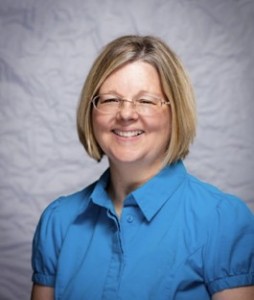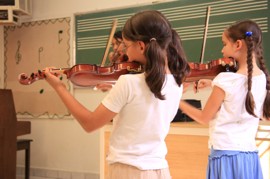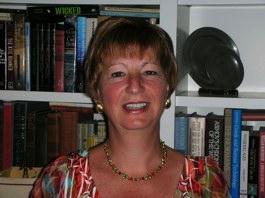Music Teacher Interviews
Former President of the Arizona State Music Teachers Association, Chyleen Lauritzen
Former President-Elect of the Colorado Music Teachers Association, Joan Sawyer
Former President of the Texas Music Teachers Association, Sharon Callahan
Interview with Chyleen Lauritzen, Former President of the Arizona State Music Teachers Association
We had the opportunity to interview piano and organ teacher Chyleen Lauritzen, who at the time of the interview was President of the Arizona State Music Teachers Association. She gave us excellent ideas and advice about teaching music and becoming a music teacher.

What led you to become a teacher?
I wanted to be a piano teacher ever since I was a child. Neither of my parents are musicians, but they fostered my interest and put me in touch with those who could help me. I especially admired and was mentored by Carla Morell, my teacher from the age of 11-17. She had a huge impact on me. She showed confidence in my ability and encouraged performance opportunities. She arranged for me to be the accompanist for a sextet singing group she belonged to. She also taught me to be a church accompanist.
I wanted a career that would be compatible with being a mother. I have 5 grown children and became a full-time piano teacher when my youngest son entered first grade. My participation prior to that consisted of 6 years, part-time. I feel I have a gift for teaching and relating to people, so teaching music as an independent teacher seemed a good fit.
How do you recommend that teachers of music use technology to connect with students?
I attended a class at the 2012 NYC MTNA Conference, where the presenter encouraged us to be “as fearless as our students” in the use of technology. It has taken quite a while for me to become comfortable with it, and I’ve had a lot of failures, but a little over a year ago I got an iPad 2 and it just clicked. I have just replaced the 2 desktop computers in my studio with iPads. I use technology to teach theory concepts and reinforce what I am doing at the piano.
Last spring, I gave a presentation at one of our local association meetings in the state and encouraged the teachers to try one new idea, whether it was simply using YouTube to show a student how a new piece might sound or using Music Teachers Helper as a web hosting service to allow student/teacher interaction. I also talk about what I am doing in the studio in our own local association meetings. I try to encourage teachers to use methods in their studio that students can relate to and be excited about. This year my students will be assigned an app to try on the iPad as well as an episode of Quaver Music to watch on it prior to their private lessons each week. I am a big fan of trying new things every year. I also follow several music teacher blogs to get new ideas.
You teach children of various ages; how do you plan for and organize your days?
In my studio, the students come to their private as well as a group theory lesson each week. They are grouped according to age, then level. I try to have a focus each week and vary the game used in each group according to their level. I plan several weeks ahead but am flexible to change things if needed. I list their theory workbook and other assignments on a whiteboard in the studio. I grade theory weekly. In their private lessons we may also have similar activities or goals.
I may ask all students if they want to participate in an upcoming event or I might check memory on pieces or discuss new ideas for playing scales or 5-finger patterns. I try to individualize the lessons but also have a similar focus for all students each week. This year I have also limited the size of my studio and have one day with no commitments. I hope to use that day as a planning and grading day. I feel that I am more effective with younger students and this year I have decided to limit my teaching to students levels 1-6. This cuts down on the hours of preparation and planning needed. I have also learned that my group lesson needs to be at the end of the day.
What are some of the challenges associated with teaching music theory to younger learners?
Children learn in a variety of ways. I have noticed that I need to be prepared to explain concepts in more than one way. I also have come to understand that in the group setting students often teach each other, which helps me. They may not understand the analogies I am using, but a peer can explain it for them. They also vary in their desire to learn and in their vocabulary. Theory introduces new terms that they may never have heard.
Younger students may get bored or distracted easily, but seem to maintain interest longer if the concept is taught in a game. It can be particularly hard to teach a proper hand shape to some younger students who have trouble relaxing their hands. It is a hard concept to teach, so I have used imagery, perhaps relating a rounded hand to an igloo where we don’t want to smash the people inside.
Can you share the aspects of teaching music that you enjoy the most, as well as some of the challenges?
I love teaching students who are excited to come every week and do what I ask. I love seeing students accomplish a challenge. I love playing duets with the students. I love finding music that clicks with the student. I love being my own boss and using creativity to reach the students. I love watching students develop over the years into fine musicians. I do not enjoy parents who question the level of music I send home or who want me to make exceptions to policies. When I have had to let a student go, it has often been because of the parent’s lack of support. It is also hard to teach students who don’t really want to be there but have to take piano in order to do sports or before they take guitar, etc.
As a Nationally Certified Teacher of Music (NCTM), do you have any advice for aspiring music teachers about the NCTM review process?
I would tell teachers who are thinking about becoming nationally certified to not be intimidated by other teachers or by feelings of inadequacy. Don’t feel you have to have a degree in music to get certified. I don’t have a music degree. You can begin where you are. I worked with a mentor and 2 other teachers to go through the process. It took us several years. We encouraged each other. Find people who can help you and go through the process with you. You can do it! Just take it one step at a time.
We thank Chyleen for spending the time to share her ideas and experiences with us. Want to learn even more about becoming a music teacher? Visit our music teacher career page.
Interview with Joan Sawyer, Former President-Elect of the Colorado Music Teachers Association
We were granted the opportunity to interview Joan Sawyer, who at the time of this interview was President-Elect of the Colorado Music Teachers Association (CSMTA). Joan gave us some great tips on getting the most out of your music education and transferring that knowledge to students.
 Which aspects of your undergraduate education helped you the most in preparing for a career as a music teacher?
Which aspects of your undergraduate education helped you the most in preparing for a career as a music teacher?
Theory and analysis courses aid in understanding the architecture of pieces and how harmony affects the shaping of phrases. Music history and literature courses provide an understanding of the culture of a given composer. Pedagogy classes offer practical teaching experience in both individual and group lessons along with feedback from a master teacher.
How do you recommend that teachers of music use technology to connect with students?
Record lessons and portions of practice sessions in order to make the most of the time and reinforce what is learned in the lessons. Listen to as much artistic playing as possible through CDs, videos, and YouTube. However, be discerning since the artistic quality of performance varies greatly.
What do you think is the biggest challenge in teaching music to students, and how do you overcome that?
It is essential to acquire the wisdom and skill to adapt to the uniqueness of each student. I recommend observing great teachers as they interact with a variety of students. Ask experienced teachers to observe your own teaching and give you honest feedback. The more teaching you do, the more experienced and skilled you become at responding in the moment to each student.
As a Doctor of Musical Arts (DMA), do you have any advice to teachers who are considering pursuing a DMA?
Take a variety of music courses, not just those in your own performance area. I was fortunate to get the DMA from a school that required three minor areas in addition to my performance major area. That enabled me to be able to teach courses in addition to my major area. Small colleges need faculty who are versatile and can teach a variety of courses.
What are some of the benefits of joining a teacher’s association like CSMTA for a new teacher?
CSMTA provides a supportive network of other teaching professionals on both the local and state levels. Certification on the national level is offered through MTNA. Continuing education is easily attained through monthly programs and yearly state and national conferences. Teacher members have opportunities for students to enter competitive and non-competitive events.
Would you be willing to share some advice for those who are currently pursuing a teaching degree?
Learn business skills because you will most likely be setting up an independent studio. Learn how to network with schools and musical organizations in your area. Enthusiastically pursue performing opportunities in a variety of venues in your community.
Thank you to Joan for sharing your time and experience with us!
Learn about becoming a teacher in Colorado
Interview with Sharon Callahan, Former President of the Texas Music Teachers Association
We had the opportunity to talk to Sharon Callahan, who at the time of this interview was serving as President of the Texas Music Teachers Association. Sharon shared some time from her busy schedule to provide insights into a music teacher career and advice for new music teachers.
 Can you tell us your story of how you got started in your music education career?
Can you tell us your story of how you got started in your music education career?
I had a wonderful private lesson piano teacher who saw my potential. As a young teenager, I began teaching beginning piano students that were on her “waiting list”. I fell in love with the students and saw how much of an impact I could have on their lives and have been teaching since the age of 14 (37 years now)!
Can you describe what a typical day looks like for you?
Usually a morning of tennis (most days), take a nice exercise walk, review notes from the previous day of piano lessons to see if any correspondence needs to be sent or copies of practice theory tests need to be printed, etc., spend a few hours answering emails/letters and anything else related to the job of President of TMTA. Then (usually mid-afternoon), I will teach for 3 to 5 hours straight (depending on the day of the week).
What aspects of working in music education do you enjoy the most?
Seeing a student smile for a job well done. Seeing their pride when they score well on a theory or music history test (earning gold medals). Feeling the excitement from a student when they receive a new piano book. Watching a student perform in public with a reduced amount of fear/stage fright from their previous performance.
What is something that you learned from experience in your career that you wish you knew when you started?
How unreasonable some of the parents can be (especially about “bending the rules” in my policy statement). Lessons in tactfulness and diplomacy are definitely needed with some parents.
What is the job outlook for music teachers in Texas?
Very bright! I receive at least two telephone calls/emails per week from potential students wanting to study the piano in my studio. The need for private piano teachers is definitely there!
How can teachers get involved with their local teacher association?
Search for the local association website and contact the membership chair – find out when the monthly meetings are scheduled and “drop in” to see what it’s all about. If a website cannot be found, visit the TMTA website and contact a local association President in your area (they are listed).
What advice would you give to new music teachers who want to be outstanding teachers?
Ask questions of experienced teachers – be their “shadow” for a few months. Attend the state and/or national convention. Find other educational opportunities (ask the local music store(s) about upcoming vendor showcases. Search the internet for any pedagogical workshops or clinics in the area. Consider obtaining MTNA National certification status (see the MTNA website, www.mtna.org, for more information).
We thank Sharon for sharing her time and thoughts with us. See our music teacher career page for additional information about becoming a music teacher.
